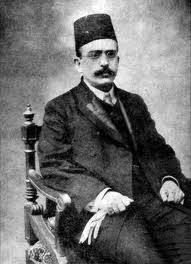Top Qs
Timeline
Chat
Perspective
Abd al-Masih al-Antaki
Syrian intellectual and journalist (1874–1923) From Wikipedia, the free encyclopedia
Remove ads
Abd al-Masih bin Fath Allah al-Antaki (Arabic: عبد المسيح بن فتح الله الأنطاكي ALA-LC: ʻAbd al-Masīḥ bin Fatḥ Allāh al-Anṭākī; 1874[1]–1923[1]), also referred to as Abd al-Masih Antaki Bey al-Halabi[a], was a Syrian intellectual, journalist and political activist[2] of the late Nahda (Arab renaissance). He founded periodicals in Aleppo and in Cairo.
Remove ads
Life
Summarize
Perspective
Abd al-Masih al-Antaki was born in Aleppo, Ottoman Syria,[1] to a prominent middle-class Aleppine family.[3] He was Eastern Orthodox.[4] He went to university in France then returned to Aleppo.[3]
In 1897, Antaki founded the magazine Ash-Shudhūr (الشذور 'The Fragments') in Aleppo.[3] It appeared twenty years after an earlier Aleppine magazine, Ash-Shahbāʼ (الشهباء 'The Gray [nickname of Aleppo]').[5] According to Reilly, "like al-Shahba its tone was didactic, but Antaki (unlike al-Shahba) saw modern Europe and particularly France as a model for an idealized concept of modernity – middle class, 'rational,' and largely free of internal contradictions and tensions.[5] Quoting Keith David Watenpaugh, Antaki advocated in his essays "a 'scientific' approach to household management and encouraged the systematic education of women and girls in home economics."[6] According to Watenpaugh, "a recurrent theme in al-Antaki's essays and those he digested from other Arabic publications and European literature is the clear valuation of things Western as inherently superior."[6]
Quoting Philipp, Antaki was "involved in Damascus in the fight for the appointment of an Arabic-speaking Patriarch for the Greek Orthodox community there."[7]
Antaki later relocated to Cairo, where journalists were less at risk of being censored.[8] There, he started the periodical Al-ʻUmrān (العمران) in 1902.[9]
Antaki revised and prefaced an edition of Francis Marrash's Ghabat al-haqq which was printed in Cairo in 1922.[10]
Antaki died in Egypt.[1]
Remove ads
Writings
- Nayl al-Amānī fī d-Dustūr al-ʻUthmānī (نيل الأماني في الدستور العثماني)
- An-Nahḍa sh-Sharqiyya (النهضة الشرقية 'The Eastern Renaissance')
- Dīwān ʻUrf al-Khizām fī Maʼāthir as-Sāda l-Kirām (ديوان عرف الخزام في مآثر السادة الكرام)
- Ad-Durar al-Ḥisān fī Manẓūmāt wa-Madāʼiḥ Mawlānā Muʻizz as-Salṭana Sardār Arfaʻ Sumuww ash-Shaykh (الدرر الحسان في منظومات ومدائح مولانا معز السلطنة سردار ارفع سمو الشيخ)
- (with Khazʻal Khān [amir of Muḥammara]): Manẓūmāt wa-madāʼih ash-Shaykh Khazʻal Khān (Cairo: Maṭbaʻat al-ʻArab, 1326 H. = 1908 M.)
- (with Karīm Khalīl Thābit and ʻAbd ar-Raḥmān al-Kawākibī): Nujūm az-zuhr fī rusūm aʻyān Miṣr (Maṭbaʻat Jarīdat Miṣr, 1905)
- Riḥlat as-Sulṭān fī riyāḍ al-Baḥrayn (Maṭbaʻat at-Tawfīq, 1916)
- Shahīd al-jaljala (Cairo: Idārat Jarīdat al-ʻUmrān, 1904)
- Tārīkh shiʻrī li-ṣadr al-Islām (Cairo: Maṭbaʻat Raʻmasīs, 1338 H. = 1920 M.)
Remove ads
Notes
References
Sources
Wikiwand - on
Seamless Wikipedia browsing. On steroids.
Remove ads

